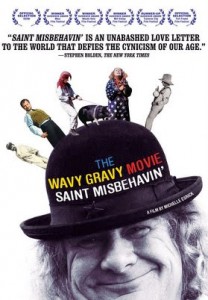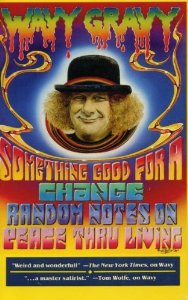
Born in 1936, Hugh Romney was an improvisational actor and standup comic who befriended Lenny Bruce and Bob Dylan when he settled in New York's Greenwich Village in the early '60s. Romney's career took him to the West Coast in the mid-'60s, where he fell in with Ken Kesey's Merry Pranksters and became a key figure in the early days of the hippie movement. Adopting the nickname “Wavy Gravy,” he embraced the persona of a playful clown, in part because he observed that hippies got arrested at protest marches, but clowns in parades did not. Wavy Gravy and his wife formed a commune in Berkley, CA, called the Hog Farm, and members of the group were hired to help with security at the Woodstock rock festival in 1969, with Romney dubbing his group “The Please Force.” Wavy Gravy became one of the more visible figures in the '60s counterculture scene, but unlike some of his peers, he never lost track of the ideals that came to symbolize the decade; well into his seventies, Wavy Gravy still works on behalf of environmental concerns, operates a camp (Camp Winnarainbow) that teaches clowning to homeless and underprivileged children, helps run a charitable organization (the Seva Foundation) that funds eye care for the poor in the Third World, and works with children living with brain injuries. Described by his friend Paul Krasner as “the illegitimate son of Harpo Marx and Mother Theresa,” Hugh Romney's remarkable life story is brought to the screen by filmmaker Michelle Esrick in the documentary Saint Misbehavin': The Wavy Gravy Movie. The film had its world premiere at the 2009 South by Southwest Film Festival.
See Also:

Gravy, court jester of the cosmos and legendary social activist–the man who runs the “Nobody For President” campaign every four years–has finally collected his humorous essays on nonviolent, political, and environmental protests in a uniquely entertaining and engaging book. “A romp.”–Publishers Weekly.
Proselytizing without preaching, Wavy Gravy (ne Hugh Romeny and perhaps best known as chief of the Please Force at the Woodstock music festival) puts forth his simple message of comedy and caring in a delightful collection of essays whose message is simple: life hurts only when you don't laugh. Gravy presents a mishmash of Buddhism, '60s political issues, advice on fund-raising and eulogies to Janis Joplin, Lenny Bruce and Abbie Hoffman, among others, and does so with such a sense of balance and humor that his occasional tendency to slide into aging-hippie doublespeak is incidental. His description of his work as a counselor in children's hospitals is particularly poignant, while his account of his own suicide attempt is darkly playful (“death bit down, found me wanting, and spat me back into the world”). Soap bubbles, garbage, various causes and one unique political campaign (in which Gravy runs for a city council seat in a clown costume) are all part of this romp through what's left of the counterculture. Copyright 1992 Reed Business Information, Inc.



